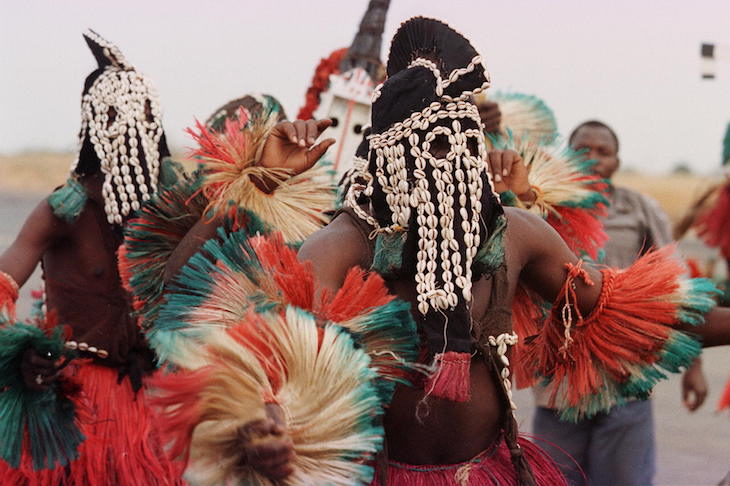Every so often a monster comes along. Here’s one — but a monster of fact not fiction, over 700 pages recounting the French expedition from Dakar to Djibouti 1931–33. It doesn’t matter that this travel diary — part field study, part confessional, first published in 1934 — has arrived so late for an English readership. It comes with the additional resonance of a lost world.
Michel Leiris was an exceptional man, a Parisian surrealist writer and protégé of Max Jacob. He was also close to Picasso, with whom he shared an interest in primitive art, shamanism and Mithraism; and he married a girl who was the illegitimate daughter of the wife of Daniel-Henry Kahnweiler, Picasso’s dealer. During the second world war, Leiris was part of the ‘Flore’ set — a coterie that included Sartre, de Beauvoir, Eluard and Camus — and after the war he became a great friend of Francis Bacon. Thanks to his wife, who’d taken over the Kahnweiler business, he was rich and often turned up in Savile Row for fittings. In London, Sonia Orwell led the chorus which told Leiris that he was the greatest living French writer.
Another key friendship was with Georges Bataille, and was based on a mutual interest in sado-masochism and satanism, to which Leiris brought his own castration complex and suicidal depressions. In 1957 he swallowed so many sleeping pills that he went into a coma and had to have a tracheotomy. But like many self-obsessed neurotics, he tended his ailments carefully, with the saintly help of his wife, and lived to be 89 (he died in 1990).
You’d never guess any of this from his translator’s 61-page introductory essay, which is far more occupied with today’s skin-colour politics than with the man who wrote the book. But Brent Hayes Edwards does explain how such an unlikely figure came to be appointed ‘secretary-archivist’ by the expedition’s leader, Marcel Griaule. Leiris had already written in 1930 of ‘the singular attraction — at once mystical and erotic — exerted by the black race . . .’ He was soon to discover through direct engagement with reality, that there is no such thing as the black race, only black races — and that a pain in the neck can come in any colour (some of the trip’s vexations are mind-boggling, if rarely dangerous). Despite those nights with Picasso at the Bal Nègre and at Bricktop’s, hanging out with Josephine Baker and Al Brown, Leiris tells us on 31 March 1932: ‘I have never slept with a black woman.’ And near the end of the journal: ‘Soon I shall have been chaste for two whole years.’ What a melancholy pierrot he is.
Phantom Africa was his first book, and it is his least phantomic, filled with clear, objective detail. Not only long, it also moves mostly at bloodhound andante. As with a Feldman score or a Rivette film, you have to slow down and settle in patiently — or not at all. It falls into two parts. The first traverses west and central Africa, whose chief delight was the Dogon tribe: ‘Until now… everyone we have met, whether negro or white, seems like a thug, a boor or a dreadful phony next to these people.’ The second part records the team’s residence in Gondar, Ethiopia, where Leiris is increasingly drawn into ritual magic:
Dinqie has very powerful zar, like Gragn, one of the most important in Gojjam, almost comparable to Seyfou. Perhaps Dinqie has ambitions to open a guenda of her own?
Two hundred pages of this is not much fun; come back, Carlos Castaneda, all is forgiven.
It was a journey not of depth (immersive ethnography was a British speciality; the French knew none of the local languages) but of breadth, right across the continent at its widest point. The European powers had briefly pacified Africa. The expedition could probably not have been managed 50 years earlier, and it couldn’t be done today. As they pass through the various colonial territories, the British come out of it well, and Leiris’s anglophilia is born: ‘England is the only western country that has successfully been able to maintain a sense of the formal.’ But the show belongs to the native societies in their superstitious, pre-modern variety.
The prime purpose of the expedition was to bring back artefacts (almost 4,000 pieces, now in the Musée de Branly in Paris). Most were fairly purchased, but the occasional depredations make for ugly reading. For Leiris, the journey was also part of his battle with futility, a seedy epic lit by bizarre, uplifting flashes. None of it is particularly surrealist. When he does interpolate his dreams they are always more banal than the place where he actually is. He made virtually no revisions to the journal prior to publication. There is no index, and no glossary of the countless esoteric words. But the work is unique and unforgettable, and the translation a marvel of quiet resolve.






Comments